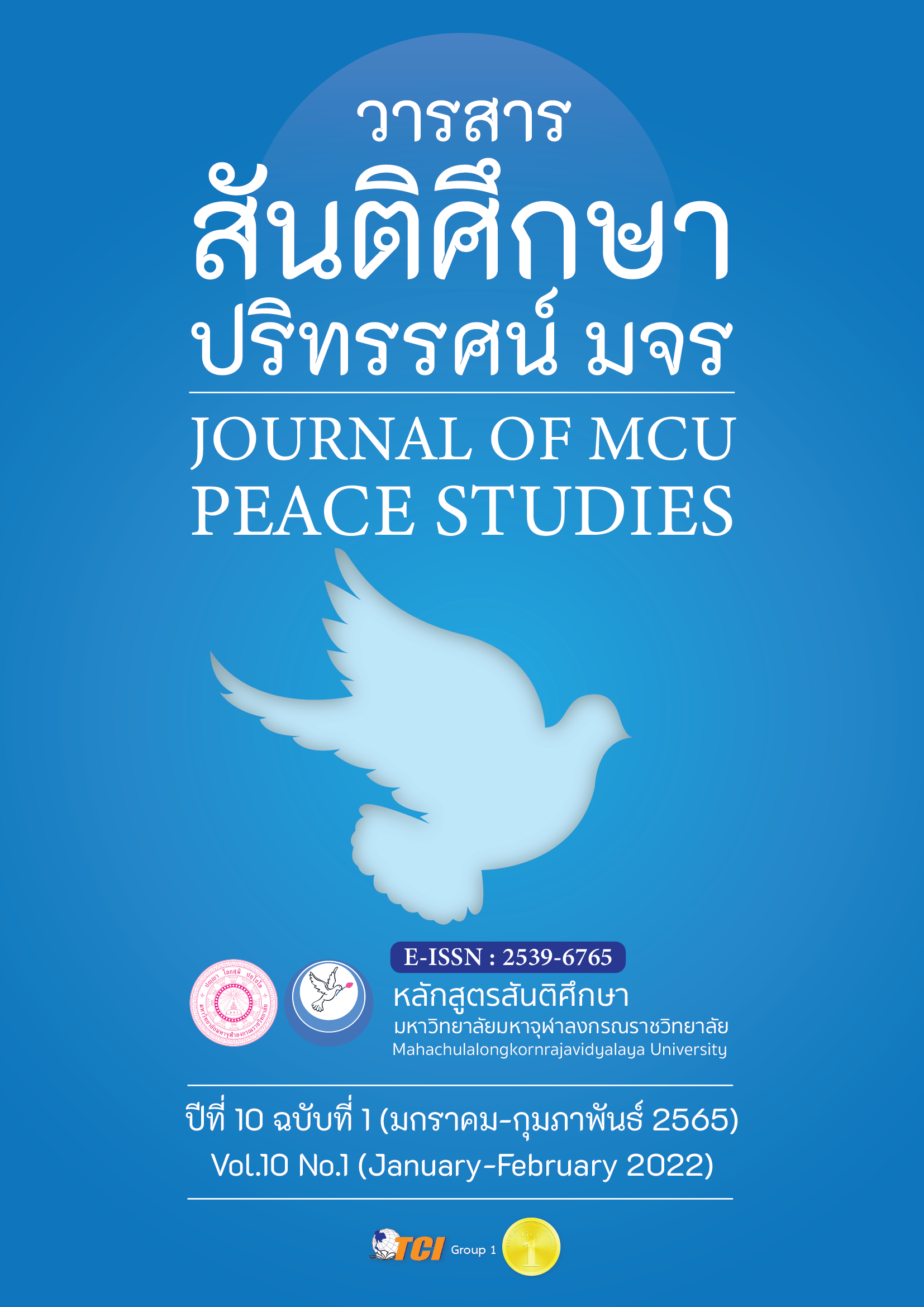สุวรรณภูมิโมเดล: พุทธอารยสุวรรณภูมิวิถีกับการสร้างคุณค่า ในมิติทางเศรษฐกิจ สังคม และวัฒนธรรม
Main Article Content
บทคัดย่อ
บทความวิจัยนี้มีวัตถุประสงค์ 1) เพื่อศึกษาและพัฒนารูปแบบการสร้างคุณค่า “สุวรรณภูมิโมเดลเชิงพุทธบูรณาการ” และ 2) เพื่อพัฒนาข้อเสนอแนะรูปแบบสุวรรณภูมิโมเดลที่สร้างคุณค่าในมิติทางเศรษฐกิจ สังคม และวัฒนธรรมตามแบบพุทธอารยสุวรรณภูมิวิถี เป็นวิจัยเชิงคุณภาพ เก็บข้อมูลโดยการสนทนาเชิงลึก และการสนทนากลุ่ม การเลือกกลุ่มเป้าหมายแบบเจาะจงเลือก (Purposive Sampling) ประกอบด้วยผู้ทรงวุฒิพื้นที่ และผู้ทรงคุณวุฒิทางวิชาการ โดยเลือกจากพื้นที่เป้าหมายศึกษาบนเส้นทาง 4 เส้นทาง ได้แก่ เส้นทางที่ 1 กรุงเทพมหานครและนครปฐม เส้นทางที่ 2 พระนครศรีอยุธยาและสุพรรณบุรี เส้นทางที่ 3 สุโขทัยและกำแพงเพชร และเส้นทางที่ 4 เชียงใหม่และเชียงราย เก็บข้อมูลระหว่าง 1 มีนาคม- 15 มิถุนายน 2562 วิเคราะห์ข้อมูลเชิงเนื้อหา (Content Analysis) ตรวจสอบเนื้อหาด้วยเทคนิคสามเส้า (Triangulation Technique) และนำเสนอผลการวิจัยเชิงพรรณนาวิเคราะห์ (Descriptive Analysis)
ผลการศึกษาพบว่า พระพุทธศาสนาได้สร้างคุณค่าในด้านเศรษฐกิจ สังคม และวัฒนธรรมสามารถพัฒนาและบูรณาการพุทธานุสติตามรูปแบบ “สุวรรณภูมิโมเดล” ภายใต้ชื่อว่า “Buddhist Suvarnabhumi Civilization (พุทธอารยสุวรรณภูมิวิถี)” 7 ด้าน ได้แก่ 1) Buddhist Ecology ทำให้ชีวิตมีสุขภาพที่ดี (Well Being Living) 2) Buddhist Sociology ทำให้สังคมปลอดภัย (Secured Living) 3) Buddhist Cognition ทำให้มีพลังความคิด (Creative Living) 4) Noble Confidence ทำให้มีความเชื่อมั่น (Worshipful Living) 5) Noble Peaceful Action ทำให้เกิดสุขภาพจิตที่ดี (Spiritual Living) 6) Buddhist Calm Meditation ทำให้มีพลังจิตปราดเปรียว (Mindful Living) และ 7) Buddhist Insight Mediation ทำให้เกิดปัญญาจัดสมดุลชีวิต (Wisdom Living) ข้อเสนอเชิงยุทธศาสตร์ คือ ภาครัฐและหน่วยงานที่เกี่ยวข้องควรที่จะนำต้นทุนทางคุณค่าของพระพุทธศาสนา มาส่งเสริมพัฒนาต่อยอดเพื่อสร้างคุณค่าในมิติเศรษฐกิจ สังคม และวัฒนธรรมทั้งระดับประเทศ และภูมิภาคให้เกิดความยั่งยืนต่อไป
Article Details

อนุญาตภายใต้เงื่อนไข Creative Commons Attribution-NonCommercial-NoDerivatives 4.0 International License.
ทัศนะและความคิดเห็นที่ปรากฏในบทความในวารสาร ถือเป็นความรับผิดชอบของผู้เขียนบทความนั้น และไม่ถือเป็นทัศนะและความรับผิดชอบของกองบรรณาธิการ ยินยอมว่าบทความเป็นลิขสิทธิ์ของวารสาร
เอกสารอ้างอิง
Department of Religious Affairs, Ministry of Culture. (2017). Moral Community Management Guidelines and Empowerment by the Power of “BoWon”. Bangkok: MCU Press.
Institute for Population and Social Research, Mahidol University. (2019). Thai Health 2019: Social Media Thai Well-being in Social World. Nakhon Pathom: Institute for Population and Social Research, Mahidol University.
Israngul Na Ayuthaya, J., & Dhammapiya, P. (2016). Following Father's Footsteps of Sufficient Life to Sustainable Development. (14th ed.). Bangkok: Pimsiripatthana.
Office of the National Economic and Social Development Council, Office of the Prime Minister. (2017). The Twelfth National Economic and Social Development Plan (2017-2021). Retrieved March 20, 2019, from https://www.nesdc.go.th/ewt_dl_link.php?nid=6422
Office of the Secretary of the National Strategy Committee, Office of the National Economic and Social Development Council, Office of the Prime Minister. ( 2018). National Strategy 2018 – 2037. Retrieved March 20, 2019, from https://www.nesdc.go.th/download/document/SAC/NS_PlanOct2018.pdf
Phra Dhammapitaka (P.A. Payutto). (2002). Dictionary of Buddhism. (11st ed.). Bangkok: Sahadhammik Press.
Phra Bhramagunabhorn (P.A. Payutto). (2013). Importance of Buddhism as the National Religion of Thailand. (19th ed.). Bangkok: Thammasapa Press.
Pongpanich, B. (2020). Buddhism and Trade Rout in Suvarnabhimi Tera Incognita. Retrieved January 25, 2021, from https://www.silpa-mag.com/on-view/art-and-culture-club/article_44638
Senanarong, A. (2015). “Sufficiency Economy” along the Royal Initiative. Bangkok: Office of the Board of Directors Special to coordinate projects due to the Royal Initiative (OFFICE OF THE NEA).
Thailand Sustainable Development Foundation. (2017 ). Sufficiency for Sustainability. Bangkok: Thailand Sustainable Development Foundation.
Thinapong, S. et al. (2019). Suvarnabhumi Terra Incognita. Bangkok: Geo-Informatics and Space Technology Development Agency (Public Organization).
Wasi, P. (2004). Development Requires a Culture. (3rd ed.). Bangkok: Moh-Chao-Ban Publishing House.
Watana, S. et al. (2018). The Stability of Buddhism in the Modern Thai Society (Research Report). Department of Religious Affairs, Ministry of Culture.
Watana, S. et al. (2021). Buddhism and Thais’ Way of Life in Suvarnabhumi. Journal of MCU Peace Studies, 9(3), 950-964.
Wongyai, V. (2019). Volunteer. Retrieved February 10, 2019, from http://www.curriculumandlearning.com


